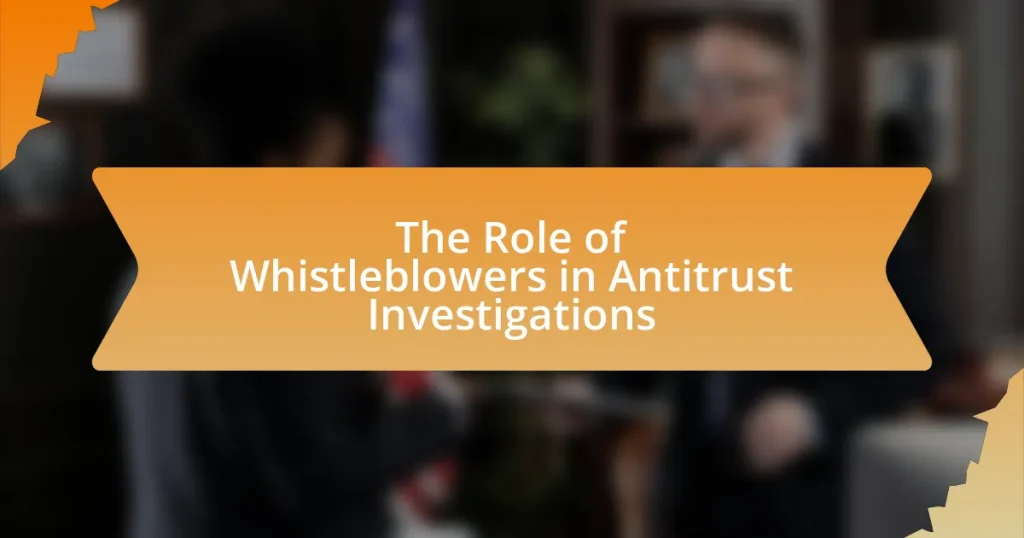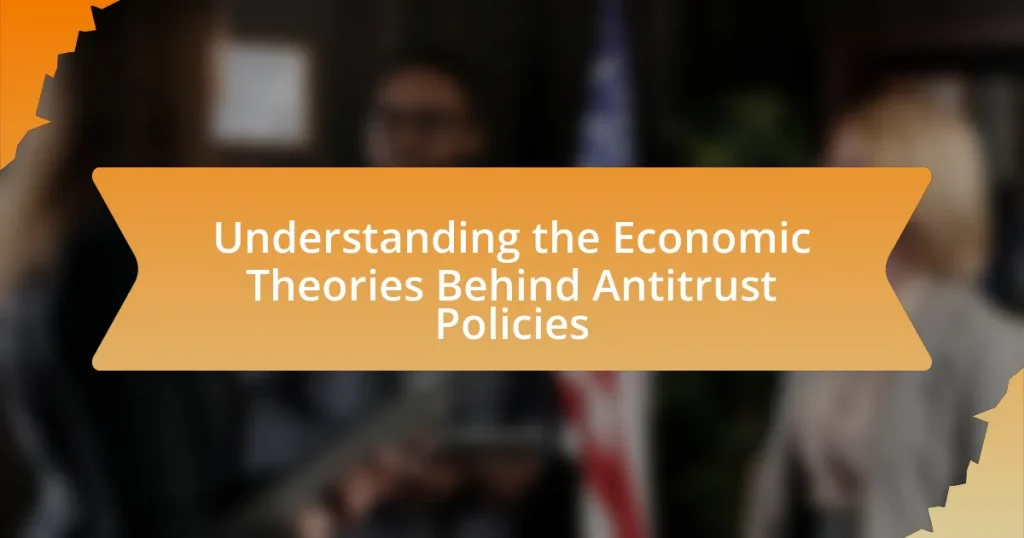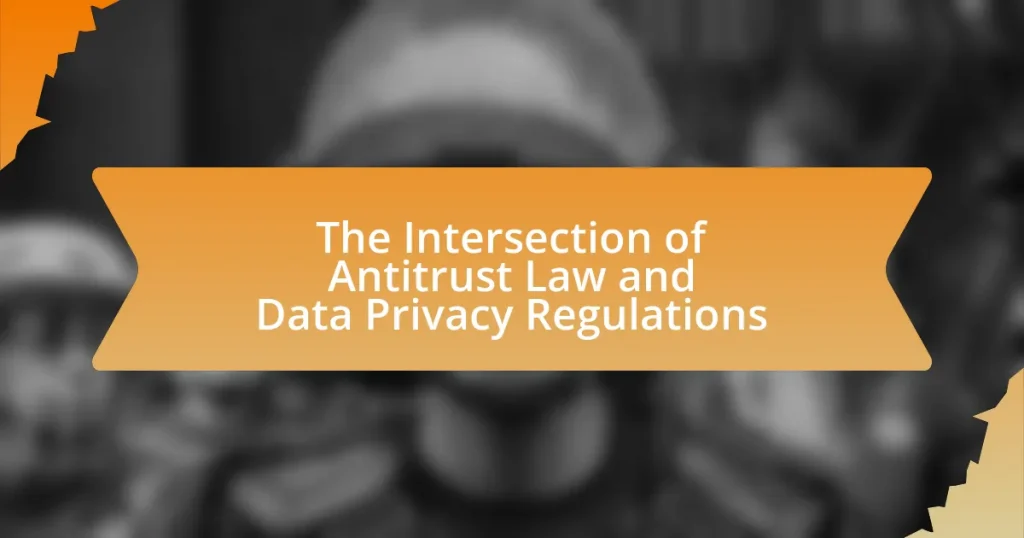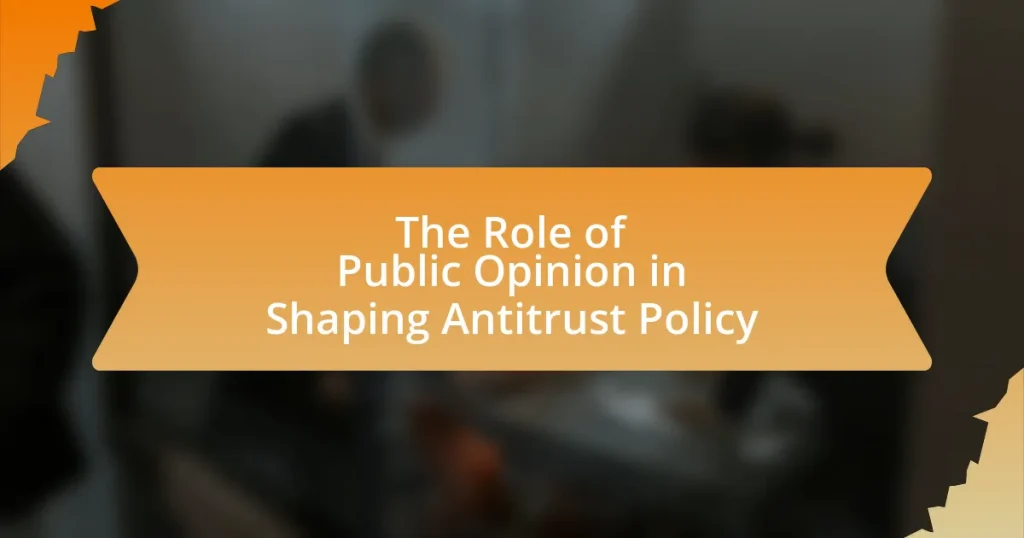Whistleblowers play a vital role in antitrust investigations by providing insider information that uncovers anti-competitive practices such as collusion and price-fixing. Their disclosures are essential for regulatory agencies like the U.S. Department of Justice and the Federal Trade Commission to initiate investigations and enforce antitrust laws effectively. The article explores the types of information whistleblowers provide, the challenges they face, the legal protections available to them, and the significant impact their involvement has on antitrust cases. Additionally, it discusses notable cases influenced by whistleblower testimony and the best practices for individuals considering reporting misconduct.
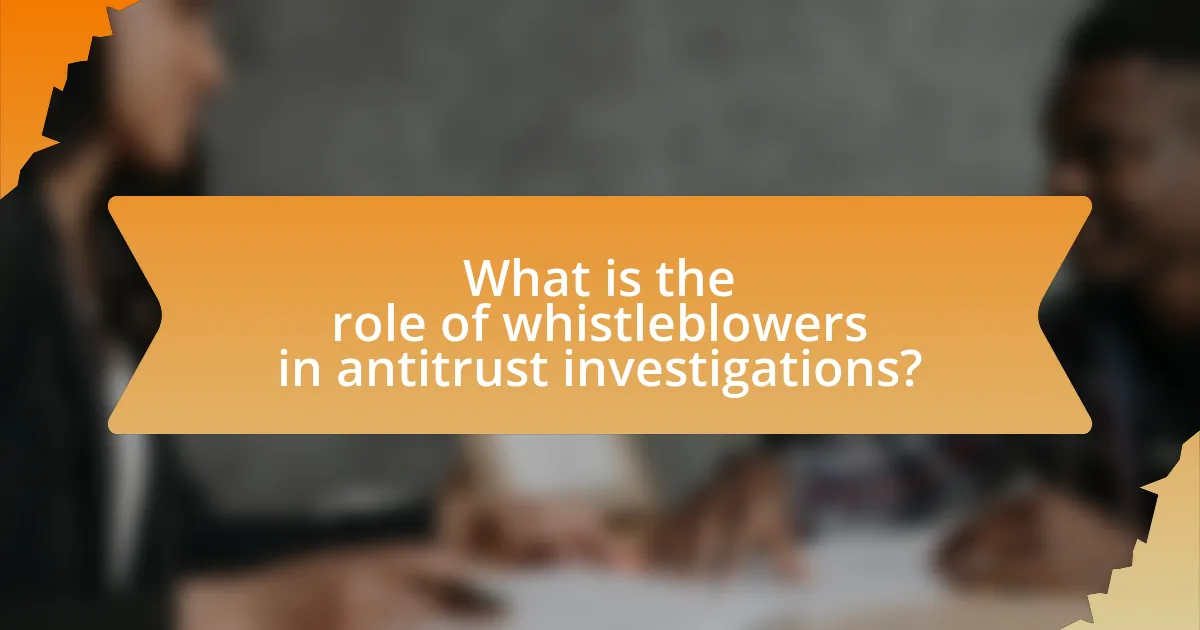
What is the role of whistleblowers in antitrust investigations?
Whistleblowers play a crucial role in antitrust investigations by providing insider information that can reveal anti-competitive practices. Their disclosures often lead to the identification of collusion, price-fixing, and other violations of antitrust laws, which might otherwise remain undetected. For instance, the U.S. Department of Justice has relied on whistleblower reports to successfully prosecute major corporations for antitrust violations, demonstrating the significant impact of such information on enforcement actions.
How do whistleblowers contribute to antitrust enforcement?
Whistleblowers contribute to antitrust enforcement by providing critical information about anti-competitive practices that may otherwise remain hidden. Their insider knowledge can reveal collusion, price-fixing, and other violations of antitrust laws, which are essential for regulatory agencies like the Federal Trade Commission and the Department of Justice to initiate investigations. For instance, the Antitrust Division of the DOJ has successfully pursued cases based on whistleblower reports, leading to significant penalties and changes in corporate behavior. This direct involvement of whistleblowers enhances the effectiveness of antitrust enforcement by ensuring that illegal activities are reported and addressed promptly.
What types of information do whistleblowers typically provide?
Whistleblowers typically provide information regarding illegal activities, unethical practices, or violations of regulations within organizations. This can include evidence of fraud, corruption, price-fixing, anti-competitive behavior, or other forms of misconduct that undermine fair competition. For instance, in antitrust investigations, whistleblowers may disclose details about collusion among companies to manipulate market prices or restrict competition, which can lead to significant legal consequences for the involved parties. Such disclosures are crucial for regulatory bodies to enforce compliance and maintain market integrity.
How does whistleblower information impact antitrust cases?
Whistleblower information significantly impacts antitrust cases by providing crucial evidence that can lead to investigations and enforcement actions against anti-competitive practices. This information often reveals insider knowledge about collusion, price-fixing, or other violations of antitrust laws that may not be accessible through traditional investigative methods. For instance, the U.S. Department of Justice has successfully pursued cases based on whistleblower tips, resulting in substantial fines and changes in corporate behavior. In 2020, a notable case involved a whistleblower’s testimony that contributed to a $1.5 billion settlement in a price-fixing investigation, demonstrating the tangible effects of such information on antitrust enforcement.
Why are whistleblowers essential in uncovering antitrust violations?
Whistleblowers are essential in uncovering antitrust violations because they provide critical insider information that can reveal anti-competitive practices. Their unique position within organizations allows them to observe and report unethical behaviors, such as price-fixing or market manipulation, that may otherwise remain hidden. For instance, the U.S. Department of Justice has successfully prosecuted numerous antitrust cases based on whistleblower testimonies, demonstrating the significant impact of their disclosures on enforcing competition laws.
What challenges do whistleblowers face in reporting violations?
Whistleblowers face significant challenges in reporting violations, including fear of retaliation, lack of legal protections, and potential damage to their careers. Fear of retaliation often manifests as threats, harassment, or job loss, discouraging individuals from coming forward. A study by the Government Accountability Office found that 40% of whistleblowers experienced retaliation, highlighting the pervasive risk involved. Additionally, many jurisdictions lack robust legal frameworks to protect whistleblowers, leaving them vulnerable to employer reprisals. This lack of protection can deter potential whistleblowers from reporting misconduct, as they may weigh the risks against the potential benefits of exposing wrongdoing. Furthermore, whistleblowers may encounter difficulties in navigating complex reporting processes, which can be intimidating and convoluted, further complicating their efforts to report violations effectively.
How do whistleblower protections influence their willingness to come forward?
Whistleblower protections significantly enhance individuals’ willingness to come forward by reducing the fear of retaliation. When robust legal frameworks, such as the Whistleblower Protection Act in the United States, are in place, they provide assurance that whistleblowers will not face job loss, harassment, or other negative consequences for reporting misconduct. Studies indicate that organizations with strong whistleblower protections see a higher rate of reporting; for instance, a 2018 report by the Ethics & Compliance Initiative found that 70% of employees are more likely to report misconduct when they believe protections are in place. This correlation underscores the importance of legal safeguards in fostering an environment where individuals feel safe to disclose unethical or illegal activities.
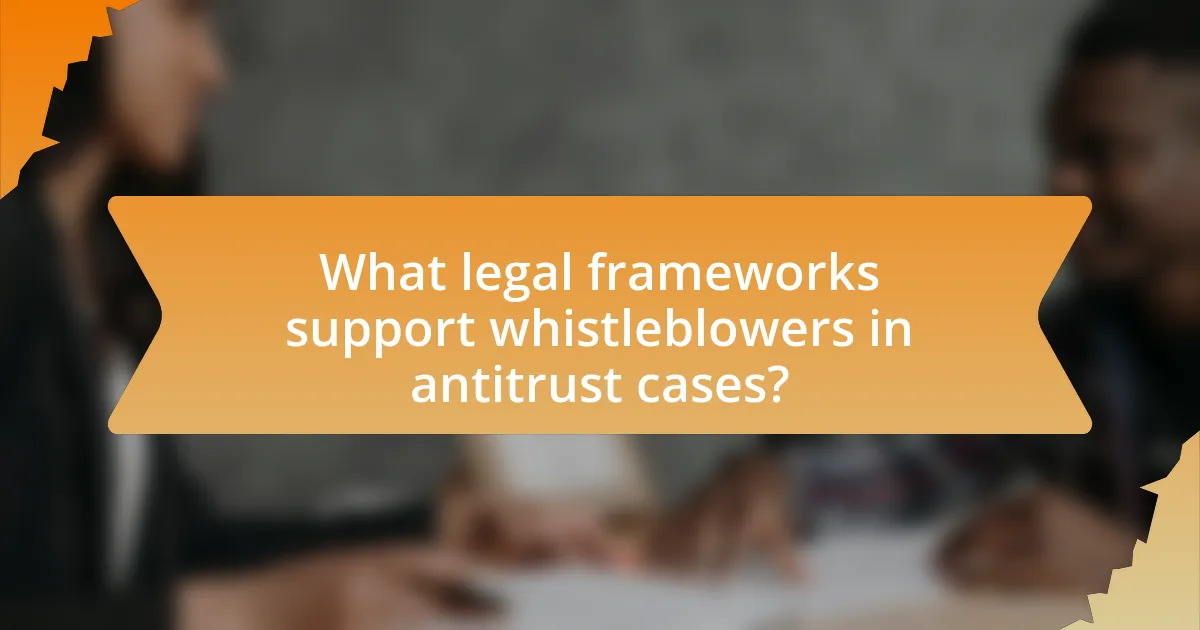
What legal frameworks support whistleblowers in antitrust cases?
Legal frameworks that support whistleblowers in antitrust cases include the Whistleblower Protection Act and provisions under the Dodd-Frank Wall Street Reform and Consumer Protection Act. The Whistleblower Protection Act provides federal employees with protections against retaliation for reporting misconduct, including antitrust violations. The Dodd-Frank Act specifically incentivizes whistleblowers by offering monetary rewards for information leading to successful enforcement actions, thus encouraging individuals to report antitrust violations. These frameworks are designed to protect whistleblowers from retaliation and promote the reporting of illegal activities in the marketplace.
What laws protect whistleblowers in the context of antitrust investigations?
Laws that protect whistleblowers in the context of antitrust investigations include the Whistleblower Protection Act and provisions under the Dodd-Frank Wall Street Reform and Consumer Protection Act. The Whistleblower Protection Act safeguards federal employees who disclose information about illegal activities, including antitrust violations, from retaliation. The Dodd-Frank Act specifically incentivizes whistleblowers by offering monetary rewards for reporting securities law violations, which can encompass antitrust issues, and provides protection against employer retaliation. These laws are designed to encourage individuals to report misconduct without fear of losing their jobs or facing other negative consequences.
How do these laws vary across different jurisdictions?
Laws regarding whistleblower protections in antitrust investigations vary significantly across different jurisdictions. For instance, the United States has the Whistleblower Protection Act, which provides federal employees with protections against retaliation, while the Dodd-Frank Act offers financial incentives for reporting securities violations, including antitrust issues. In contrast, the European Union has established the Whistleblower Protection Directive, which mandates member states to implement comprehensive protections for whistleblowers in various sectors, including competition law. Additionally, countries like Canada have their own specific whistleblower laws, such as the Public Servants Disclosure Protection Act, which varies in scope and enforcement compared to U.S. and EU regulations. These differences highlight the diverse legal frameworks and protections available to whistleblowers in antitrust investigations globally.
What are the consequences for companies that retaliate against whistleblowers?
Companies that retaliate against whistleblowers face significant legal and financial consequences. Retaliation can lead to lawsuits under various whistleblower protection laws, such as the Whistleblower Protection Act in the United States, which can result in substantial monetary damages, including back pay, reinstatement, and attorney fees. Additionally, companies may suffer reputational damage, leading to loss of business and trust among consumers and investors. Studies indicate that organizations with a culture of retaliation experience higher turnover rates and lower employee morale, which can further impact productivity and profitability.
How do whistleblower programs operate within antitrust agencies?
Whistleblower programs within antitrust agencies operate by encouraging individuals to report anti-competitive behavior, such as price-fixing or market manipulation, often providing financial incentives and legal protections. These programs are designed to gather critical information that may not be accessible through traditional investigative methods, thereby enhancing the agencies’ ability to enforce antitrust laws effectively. For instance, the U.S. Department of Justice’s Antitrust Division offers rewards for information leading to successful prosecutions, which can amount to a percentage of the fines collected. This approach has proven effective, as evidenced by numerous cases where whistleblower tips have led to significant investigations and penalties against corporations engaging in anti-competitive practices.
What processes are in place for whistleblowers to report violations?
Whistleblowers can report violations through established channels such as internal reporting systems, external regulatory bodies, and legal protections. Organizations typically implement anonymous hotlines or designated compliance officers to facilitate internal reporting, ensuring confidentiality and protection from retaliation. Additionally, external agencies like the Federal Trade Commission (FTC) or the Securities and Exchange Commission (SEC) provide platforms for whistleblowers to report antitrust violations, often with legal safeguards to protect their identities and prevent workplace retaliation. These processes are reinforced by laws such as the Whistleblower Protection Act, which offers legal recourse for whistleblowers facing discrimination or retaliation for their disclosures.
How do antitrust agencies evaluate and act on whistleblower tips?
Antitrust agencies evaluate and act on whistleblower tips by conducting a thorough assessment of the information provided to determine its credibility and relevance. Agencies like the Federal Trade Commission (FTC) and the Department of Justice (DOJ) analyze the details of the tip, including the specificity of the allegations, the evidence presented, and the potential impact on competition. They may corroborate the information through additional investigations or data analysis. For instance, the DOJ has established a leniency program that encourages whistleblowers to come forward, which has led to significant antitrust enforcement actions, demonstrating the effectiveness of such tips in uncovering anti-competitive practices.
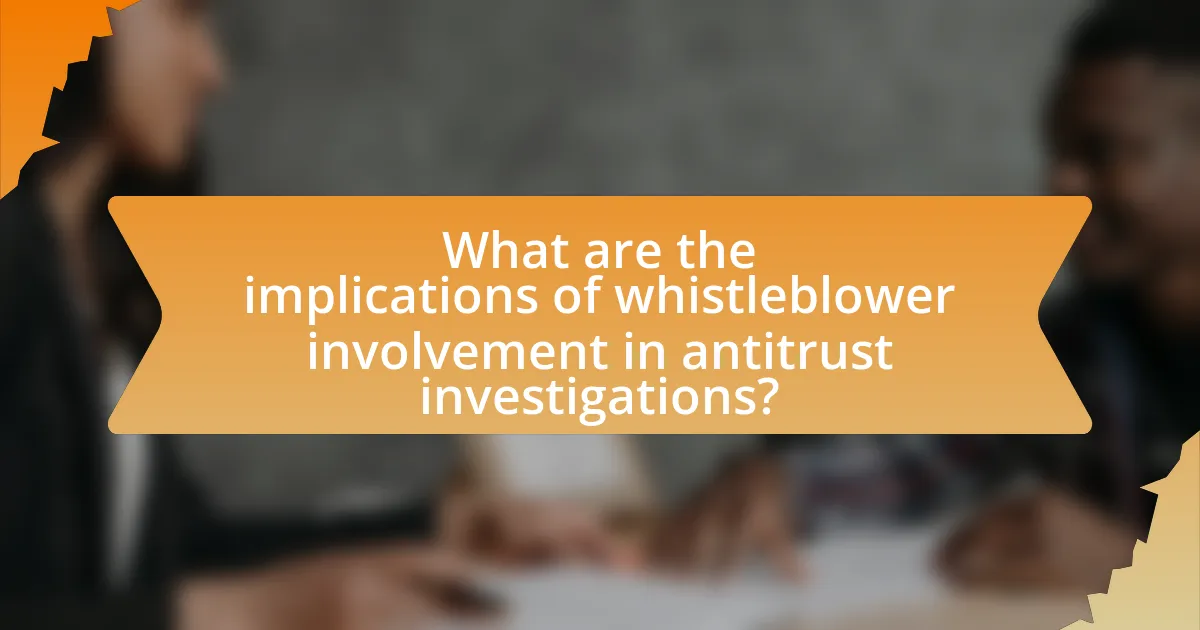
What are the implications of whistleblower involvement in antitrust investigations?
Whistleblower involvement in antitrust investigations significantly enhances the detection and prosecution of anti-competitive practices. By providing insider information, whistleblowers can reveal unlawful activities such as price-fixing, market allocation, and bid-rigging, which may otherwise remain hidden. For instance, the U.S. Department of Justice has successfully prosecuted numerous cases based on whistleblower tips, leading to substantial fines and changes in corporate behavior. Additionally, whistleblower protections encourage individuals to come forward without fear of retaliation, thereby increasing the volume of actionable intelligence available to regulators. This dynamic not only aids in enforcing antitrust laws but also promotes a culture of compliance within industries, ultimately benefiting consumers through fairer market practices.
How do whistleblowers influence the outcomes of antitrust cases?
Whistleblowers significantly influence the outcomes of antitrust cases by providing critical insider information that can lead to successful investigations and prosecutions. Their disclosures often reveal anti-competitive practices, such as price-fixing or market manipulation, which may not be easily detectable through standard regulatory oversight. For instance, the case against the financial services company, Visa, was bolstered by whistleblower testimony that exposed collusion among major credit card companies, ultimately resulting in substantial fines and changes in industry practices. This demonstrates that whistleblower contributions can be pivotal in uncovering violations that might otherwise remain hidden, thereby shaping the enforcement landscape of antitrust laws.
What notable cases have been impacted by whistleblower testimony?
Notable cases impacted by whistleblower testimony include the Enron scandal, where Sherron Watkins exposed accounting fraud, leading to significant legal repercussions and reforms in corporate governance. Another example is the case against the pharmaceutical company GlaxoSmithKline, where whistleblower Dr. John Buse revealed unethical practices related to drug marketing, resulting in a $3 billion settlement. Additionally, the case involving the financial institution Wells Fargo saw whistleblower testimonies regarding fraudulent account openings, prompting investigations and substantial fines. These cases illustrate the critical role of whistleblowers in uncovering misconduct and influencing legal outcomes in antitrust investigations.
How does whistleblower involvement affect public perception of antitrust enforcement?
Whistleblower involvement positively affects public perception of antitrust enforcement by enhancing transparency and accountability. When individuals come forward with information about anti-competitive practices, it signals to the public that regulatory bodies are actively working to uphold fair competition. Research indicates that whistleblowers often provide critical evidence that leads to successful investigations and enforcement actions, thereby reinforcing trust in the antitrust system. For instance, the U.S. Department of Justice has reported that whistleblower tips have been instrumental in uncovering significant antitrust violations, which in turn boosts public confidence in the effectiveness of enforcement efforts.
What best practices should potential whistleblowers consider?
Potential whistleblowers should consider documenting all relevant information and evidence before reporting misconduct. This practice ensures that they have a clear and comprehensive account of the wrongdoing, which can strengthen their case. Additionally, they should familiarize themselves with the legal protections available to whistleblowers, such as the Whistleblower Protection Act, which safeguards individuals from retaliation. Consulting with a legal expert can provide guidance on the reporting process and help navigate potential risks. Furthermore, whistleblowers should choose the appropriate reporting channel, whether internal or external, to ensure their concerns are addressed effectively. These best practices are crucial for maximizing the impact of their disclosures and protecting their rights.
How can whistleblowers protect themselves during the reporting process?
Whistleblowers can protect themselves during the reporting process by ensuring confidentiality and seeking legal counsel. Maintaining anonymity is crucial, as it reduces the risk of retaliation from the organization being reported. Legal counsel can provide guidance on rights and protections under laws such as the Whistleblower Protection Act, which safeguards individuals from employer retaliation for reporting misconduct. Additionally, documenting all communications and actions related to the report can serve as evidence if retaliation occurs, reinforcing the whistleblower’s position.
What resources are available for whistleblowers seeking guidance?
Whistleblowers seeking guidance can access various resources, including legal aid organizations, government agencies, and dedicated hotlines. Legal aid organizations, such as the National Whistleblower Center, provide information on rights and protections available to whistleblowers. Government agencies like the U.S. Securities and Exchange Commission (SEC) and the Occupational Safety and Health Administration (OSHA) offer specific programs and resources for reporting misconduct. Additionally, hotlines such as the Whistleblower Protection Hotline allow individuals to seek confidential advice and support. These resources are designed to help whistleblowers navigate the complexities of reporting wrongdoing while ensuring their rights are protected.
